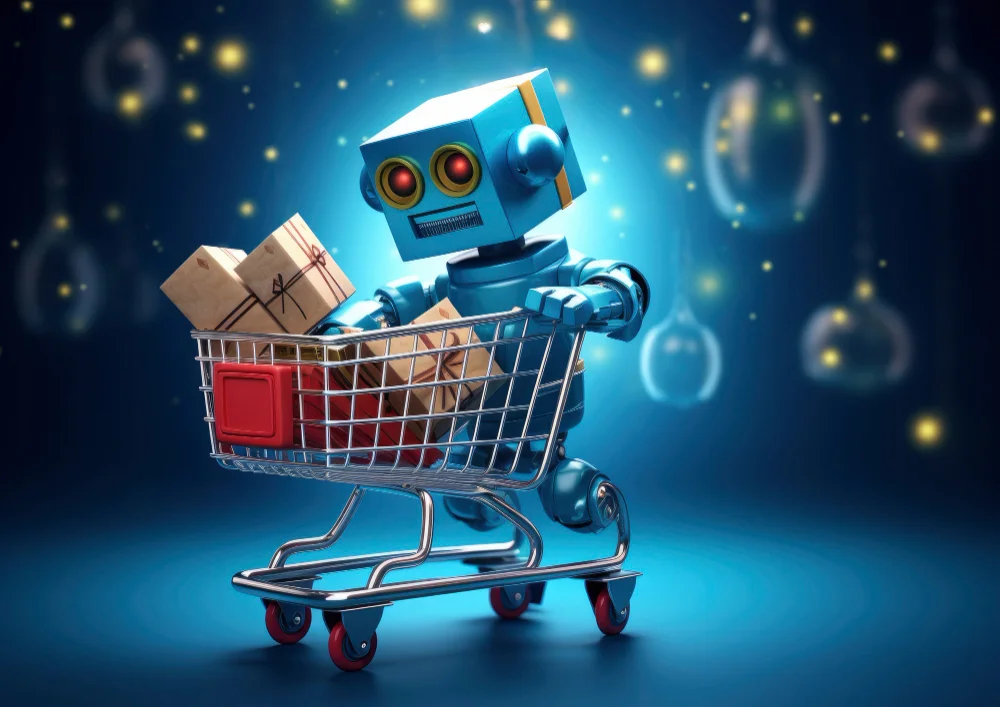The world of online business is changing faster than ever, and Artificial Intelligence is leading this revolution. Whether you’re running a small online store or a large e-commerce brand, the right AI tools can help you save time, reduce errors, and sell more efficiently. The best AI tools for ecommerce are designed to automate daily operations, personalize shopping experiences, and turn data into real profit.
Let’s explore how these innovative tools can completely reshape the future of your ecommerce business from customer interaction to advanced analytics and creative marketing.
1. The Power of AI in Ecommerce
Artificial Intelligence has evolved from a luxury into a necessity for online sellers. It helps businesses analyze customer behavior, predict trends, and automate decisions that used to take hours of manual work.
AI isn’t just about smart algorithms it’s about making your store more human by understanding customer needs and emotions. From personalized recommendations to smart chatbots, every feature enhances the user journey and increases retention.
2. How to Choose the Right AI Tool

Selecting the right AI tool for your ecommerce business can feel overwhelming with so many options on the market. The key is to focus on your store’s specific goals, whether it’s improving customer experience, automating repetitive tasks, or optimizing product recommendations. The best choice is the one that integrates smoothly, provides measurable results, and grows with your business.
Key Factors to Consider Before Choosing
-
Ease of Integration: Make sure the tool connects effortlessly with your ecommerce platform, like Shopify, WooCommerce, or Magento.
-
Scalability: Select a solution that adapts as your customer base and data grow over time.
-
Data Security: Always prioritize AI tools that comply with GDPR and other global privacy regulations.
-
User-Friendliness: Look for a clean interface and helpful onboarding tutorials that make setup simple.
-
Support and Training: Strong customer support and educational resources are vital for smooth implementation.
-
Transparent Analytics: The tool should clearly show how and why it makes recommendations or predictions.
3. Top AI Tools for Ecommerce Success
Choosing the right tools can make all the difference between an average store and a thriving ecommerce brand. AI-powered solutions are now essential for businesses that want to streamline operations, personalize customer journeys, and increase revenue. Let’s explore some of the most effective AI tools reshaping ecommerce today.
Jasper AI: Smart Content Creation Assistant
Jasper AI is one of the most powerful tools for creating marketing content effortlessly. It helps ecommerce brands write compelling product descriptions, blog posts, and ad copies within seconds. By understanding tone and intent, Jasper ensures your content remains persuasive and brand-consistent.
Nosto: Best AI Tools for Ecommerce
Nosto uses advanced machine learning to deliver tailor-made product recommendations. It tracks user behaviour in real-time to show shoppers items they are most likely to purchase. This personalized experience not only enhances engagement but also boosts sales by offering relevant suggestions.
Tidio: AI Chatbot and Customer Support
Tidio combines live chat and AI automation to provide round-the-clock customer support. It answers common questions instantly, helps track orders, and even captures leads for future marketing. The chatbot learns from each interaction, ensuring responses get better over time. Small to medium-sized ecommerce businesses benefit most from Tidio’s ability to save time while keeping customers happy and informed.
Frase: AI Content Optimization Tool
Frase is designed for ecommerce owners who want to dominate search results with optimized content. It analyzes top-ranking pages on Google and suggests what to include to make your content stand out. Whether you’re writing blogs, FAQs, or product pages, Frase ensures your content matches user intent and follows the best SEO practices. It’s an intelligent companion for digital marketers aiming for organic growth.
Dynamic Yield: Predictive Personalization Engine
Dynamic Yield uses predictive analytics to deliver customized experiences across multiple channels. From personalized product displays to automated email recommendations, it helps you understand what each shopper wants before they do.
4. AI Tools for Customer Support and Automation

Providing top-notch customer support is one of the most important aspects of running a successful ecommerce business. With AI automation, you can deliver instant replies, handle multiple queries simultaneously, and personalize customer experiences around the clock. These tools not only improve response time but also build trust, loyalty, and efficiency ensuring every shopper feels valued.
Best AI Tools for Ecommerce & Customer Support
-
Tidio: An intelligent chatbot platform that combines live chat and automation to provide 24/7 customer service. It can answer FAQs, track orders, and engage users instantly.
-
HubSpot Chatbot Builder: An intelligent assistant that connects directly with your CRM, helping you qualify leads, respond to customers, and book meetings automatically.
-
Chatfuel: A user-friendly AI tool for creating chatbots across Messenger, Instagram, and websites no coding required. It ensures consistent and personalized communication.
-
Drift: Designed for conversational marketing, Drift uses AI to initiate real-time chats, engage website visitors, and turn them into qualified sales leads.
-
Intercom: A powerful automation tool that blends AI and human support, offering automated replies, lead generation, and multilingual assistance.
5. Boosting Conversions with Predictive Analytics
Predictive analytics is one of the most powerful applications of AI in ecommerce. It uses historical data, shopping behavior, and real-time trends to forecast what customers will do next.
By analyzing this data, businesses can identify the best time to send promotions, adjust prices intelligently, and recommend products that perfectly match each shopper’s interests. This leads to higher conversions and stronger customer engagement.
As a result, e-commerce stores can save time, reduce losses, and deliver a shopping experience that feels personalized and perfectly timed. To explore how advanced AI innovations are transforming digital marketing, check out the latest AI tools designed to boost business performance.
6. Best AI Tools for E-commerce & Advertising

AI marketing tools simplify ad targeting, keyword optimization, and creative design. Instead of guessing what might work, these systems analyze millions of data points to determine what will work.
Popular AI Marketing Platforms
- AdCreative.ai: Automatically generates conversion-focused visuals and ad copies.
- Phrasee: Optimizes email subject lines and brand messaging for higher engagement.
- SurferSEO: Enhances SEO content by analyzing top-ranking pages and suggesting improvements.
Together, these tools ensure your marketing efforts are data-driven and highly effective.
7. AI Tools for Inventory & Operations
Efficient inventory and operational management are crucial for every ecommerce business. Artificial Intelligence simplifies these complex processes by predicting demand, tracking stock levels, and optimizing logistics. With AI, store owners can eliminate costly errors, avoid stockouts, and ensure smooth order fulfillment ultimately improving both customer satisfaction and profitability.
Lily AI: Best AI Tools for Ecommerce
Lily AI transforms raw product information into customer-friendly data that enhances accuracy across catalogues. It uses machine learning to understand product attributes, improving how items are categorized and displayed. This makes inventory data more searchable and helps customers find what they’re looking for faster, boosting sales efficiency.
Brightpearl: Automated Retail Operations Platform
Brightpearl streamlines backend operations by automating order management, demand forecasting, and accounting. It allows ecommerce businesses to handle peak seasons effortlessly without delays or overstocking. By combining real-time data insights with automation, Brightpearl ensures smooth day-to-day operations and faster order processing.
Stocky (by Shopify): Smart Inventory Forecasting
Stocky, built for Shopify users, helps predict which products will sell best based on past sales patterns and seasonal demand. It automates stock ordering, ensuring you never run out of high-demand items. For small to medium-sized stores, Stocky is a cost-effective solution that reduces waste and optimizes cash flow.
SkuVault: AI Warehouse Management Solution
SkuVault focuses on improving warehouse operations through automation and data analytics. It tracks every item in real time, minimizing human errors in picking, packing, and shipping. By offering complete visibility into inventory movement, it ensures faster fulfilment and better customer satisfaction, even during busy sales periods.
8. Visual AI and Image Optimization Tools
In e-commerce, visuals are everything. AI image tools help brands create consistent, attractive product photos that convert visitors into buyers.
AI image recognition can automatically tag, edit, and categorize photos. It also supports visual search, where customers can upload an image to find similar products.
Key Feature:
- Remove.bg: Removes image backgrounds instantly with high precision.
- Let’s Enhance: Improves image resolution for crisp, professional results.
- Pixyle.ai: Identifies products within an image to help with catalogue automation.
These tools create a flawless visual experience that keeps customers browsing longer.
9. How AI Enhances Customer Retention

AI isn’t just about getting new buyers; it helps you keep them. With customer behaviour analysis, AI tools can identify when someone is about to stop buying and send personalized re-engagement messages.
AI-driven loyalty systems also offer tailored rewards that keep users coming back. Over time, this builds strong emotional connections and boosts lifetime value.
Use these strategies: Best AI Tools for Ecommerce
- Automate post-purchase follow-ups.
- Predict churn and offer custom discounts.
- Personalize recommendations based on past purchases.
By using retention-focused AI tools, you create sustainable, long-term growth.
10. Future of AI in Ecommerce
The future of ecommerce is intelligent, connected, and adaptive. As generative AI evolves, we’ll see tools that not only react to customer behaviour but also predict it with incredible accuracy.
Soon, ecommerce platforms will automatically handle pricing, content generation, and even voice-assisted shopping. This means smoother experiences for users and effortless scalability for brands.
In the coming years, success will belong to businesses that embrace AI early those that see it as a partner, not a replacement.
Conclusion: Best AI Tools for Ecommerce
Selecting the best AI tools for ecommerce is no longer just a trend; it’s a strategic move for long-term success. From marketing automation and customer support to analytics and image optimization, AI covers every part of your online business.
The secret is balance using AI to enhance human creativity and decision-making, not replace it. Start with one or two tools, measure the results, and keep expanding. With the right combination, your e-commerce brand can operate smarter, faster, and more profitably than ever before.











